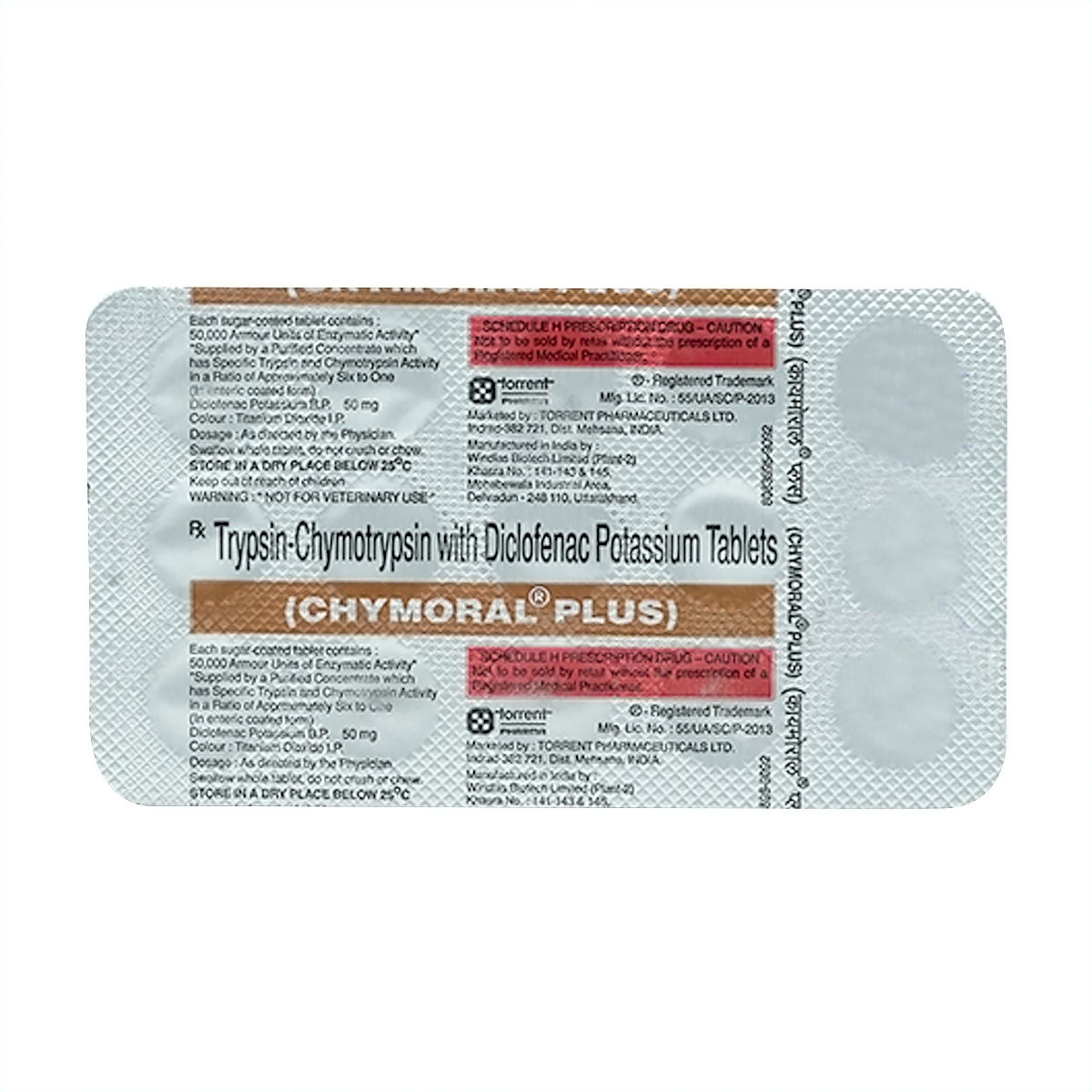Trypcet-D Tablet
₹141.3*
MRP ₹157
10% off
₹133.45*
MRP ₹157
15% CB
₹23.55 cashback(15%)
Free Delivery
With Circle membership
(Inclusive of all Taxes)
This offer price is valid on orders above ₹800. Apply coupon PHARMA10/PHARMA18 (excluding restricted items)
Know Your Delivery Time
Provide Delivery Location

Whats That

Secure Payment

India's Most Trusted Pharmacy

Genuine Products
Composition :
Consume Type :
Return Policy :
About Trypcet-D Tablet
Trypcet-D Tablet is a combination medicine used to relieve pain and inflammation associated with osteoarthritis, rheumatoid arthritis, ankylosing spondylitis, muscle pain, and bone and joint pain. Pain is a symptom triggered by the nervous system, causing uncomfortable sensations in the body. Arthritis, also known as joint inflammation, is the tenderness and swelling of the joints. Symptoms include swelling, pain, and stiffness.
Trypcet-D Tablet is a combination of two drugs: Diclofenac and Trypsin-chymotrypsin. Diclofenac works by blocking the effect of chemical messengers called prostaglandins by inhibiting cyclooxygenase (COX) enzymes, thereby reducing mild to moderate pain and inflammation at the injured or damaged site. Trypsin-chymotrypsin breaks down the abnormal proteins at the site of inflammation, thereby reducing swelling and inflammation.
Take Trypcet-D Tablet as prescribed. Your doctor will decide the dosage of this medicine based on your condition. In some cases, you may experience some common side effects, such as nausea, vomiting, stomach pain, loss of appetite, indigestion, and diarrhoea. Most of these side effects do not require medical attention and will resolve gradually over time. However, you are advised to talk to your doctor if you experience these side effects persistently.
Consult your doctor before taking Trypcet-D Tablet if you are pregnant or breastfeeding. Trypcet-D Tablet may cause dizziness, so drive with caution. Trypcet-D Tablet is not recommended for children as safety and efficacy have not been established. Avoid consuming alcohol along with Trypcet-D Tablet as it could lead to increased dizziness; it might also increase the risk of stomach bleeding. Keep your doctor informed about your health condition and medicines to rule out any side effects.
Uses of Trypcet-D Tablet
Directions for Use
Medicinal Benefits
Trypcet-D Tablet is a combination of two drugs: Diclofenac and Trypsin-chymotrypsin. Trypcet-D Tablet is used to relieve pain and inflammation associated with osteoarthritis, rheumatoid arthritis, ankylosing spondylitis, muscle pain, and bone and joint pain. Diclofenac is an NSAID (Non-Steroidal Anti-Inflammatory Drug) which works by blocking the effect of chemical messengers called prostaglandins by inhibiting cyclooxygenase (COX) enzymes, thereby reducing mild to moderate pain and inflammation at the injured or damaged site. Trypsin-chymotrypsin is a combination of enzymes that breaks down the abnormal proteins at the site of inflammation, thereby reducing swelling and inflammation by increasing the blood supply at the affected area.
How Trypcet-D Tablet Works
Storage
Side Effects of Trypcet-D Tablet
- Nausea
- Vomiting
- Stomach pain
- Diarrhoea
- Indigestion
- Loss of appetite
What if I have taken an overdose of Trypcet-D Tablet
Drug Warnings
Do not take Trypcet-D Tablet if you are allergic to any of its contents; if you have/had severe heart problems, stomach ulcer or perforation, and bleeding problems such as bleeding from the stomach, intestine or brain, bypass surgery, heart attack, blood circulation problems, or inflammation of intestines. Inform your doctor before taking Trypcet-D Tablet if you have/had high blood pressure, heart problems, high cholesterol, diabetes, asthma, angina, bowel problems, blood clotting disorder, a habit of smoking, or liver and kidney problems. Consult your doctor before taking Trypcet-D Tablet if you are pregnant or breastfeeding. Stop taking Trypcet-D Tablet and consult your doctor immediately if you have stomach pain or any signs of bleeding in the intestine or stomach, such as blood in stools. If you have had any recent heart surgery, talk to your doctor before starting Trypcet-D Tablet as it may increase the risk of heart attack or stroke. Do not take any other NSAIDs for pain relief along with Trypcet-D Tablet unless prescribed by the doctor.
Diet & Lifestyle Advise
- Daily exercise helps in muscle stretching, making them less likely to spasm, tear and sprain. Mild exercises such as jogging and walking are helpful for muscle stretching.
- Massages can also be helpful.
- Avoid freezing and hot temperatures.
- Rest well. Get optimum sleep.
- To avoid developing pressure sores, change your position every two hours.
- Hot or cold therapy can help treat muscle spasms. Apply an ice pack or hot pack on the muscle for 15-20minutes.
- Stay hydrated, and drink plenty of water.
- Avoid smoking and alcohol consumption.
Habit Forming
Therapeutic Class
Trypcet-D Tablet Substitute

Chymoral Plus Tablet 15's
₹14.34per tabletSistal Plus Tablet 10'S
₹12.33per tabletK TRIP PLUS TABLET 10'S
by AYUR
₹7.05per tabletChymofast-D Tablet 10's
by AYUR
₹7.20per tabletZapsyn D Tablet 10's
₹8.55per tablet
Product Substitutes
Alcohol
Caution
Avoid consumption of alcohol while taking Trypcet-D Tablet as it may cause increased dizziness. It can also increase the risk of stomach bleeding.
Pregnancy
Caution
If you are pregnant, please consult your doctor before taking Trypcet-D Tablet. Your doctor will prescribe only if the benefits outweigh the risks.
Breast Feeding
Caution
Consult your doctor before taking Trypcet-D Tablet if you are breastfeeding. Your doctor will prescribe only if the benefits outweigh the risks.
Driving
Caution
Trypcet-D Tablet may cause dizziness. Do not drive or operate machinery unless you are alert.
Liver
Caution
Dose adjustment may be needed in patients with liver impairment. Please consult your doctor if you have a liver impairment or any concerns regarding this.
Kidney
Caution
Dose adjustment may be needed in patients with kidney impairment. Please consult your doctor if you have kidney impairment or any concerns regarding this.
Children
Unsafe
Trypcet-D Tablet is not recommended for children as safety and effectiveness have not been established.
FAQs
Manufacturer/Marketer address
Disclaimer
Author Details
We provide you with authentic, trustworthy and relevant information












